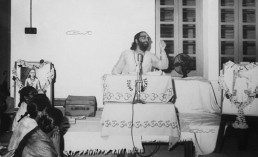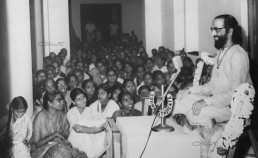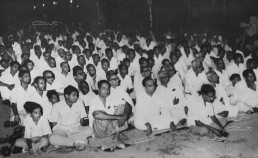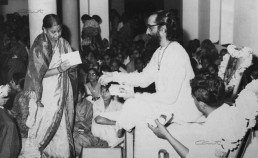
Jnana Yajna 95

Year & Dates:
October 14, 1961 to October 28, 1961

Yajna Topic:
Shrimad Bhagavad Gita- Chapter 6

Place:
Hyderabad, India
Hyderabad’s Shantinagar became the hub to discover what everlasting peace truly meant when it was chosen as the venue for Pujya Gurudev’s 95th Jnana Yajna. The vast quadrangle enclosed on all sides by new houses gained prominence because of the yajnashala it held from October 14 to October 28, 1961.
On the inaugural evening of October 14th, after the Om flag sanctified the space, Justice Munikannaya, the president of the Shantinagar committee, appreciated Pujya Gurudev for leading the post-independence generation to a higher goal.
The focus of the Jnana yajna was Gita’s chapter 6, Dhyana Yoga. Pujya Gurudev captivated the huge gathering from the very moment He soulfully chanted “Om” thrice. The thousands-strong gathering chanted with Him in perfect unison, and the yajna was underway, unmindful of external disturbances. The preparations to step into a world of meditation commenced.
Through Penance and Meditation
The yajna phenomenon predictably played out. The crowds grew by the thousands every evening in spite of bad weather conditions, always surprising the organizers. The seekers listened carefully to Pujya Gurudev’s tips from the sixth chapter to becoming meditation-worthy. In the journey from a sadhaka, a seeker, to the Perfected Sthitaprajna, He outlined the path of right action to be sufficiently purified.
In His morning classes held at the Andhra Yuvathi Mandali from October 17th, the text studied was Panchadashi. The Nataaka Deepa Prakarana chapter challenged the seekers and enthused them to absorb deeply the words of Pujya Gurudev. The hall began overflowing in the morning sessions too as the avid seekers enjoyed the devotional rendering of the Shankara Guru Stotra and Shankara Stuti composed by Adi Shankaracharya’s great disciple, Totakacharya.
Pujya Gurudev carried the message of spiritual empowerment to the army barracks staff at Trimulgherry (now Tirumalagiri) Mandir on October 22nd, speaking about “Religion In Daily Life.” The army families gratefully offered Bhiksha and reveled in a joyfully enriching satsang with Pujya Gurudev. The hope and learning throughout the yajna was voiced in a report that said: “Integration of India is not far when Chinmaya is amidst us. He is integrating the individual through whom the family will be united, the society will be improved, the states will enjoy a harmonious existence, and slowly, the nation will rise up fully integrated.”
A Meditation Minute:
सान्दीपनीति भुवनप्रथितं प्रशान्तं अध्यासितं परममंगलमालयाग्रयम् ।
श्रीमत्तपोवनतपोधनशिष्यवर्य श्रीचिन्मयं गुरुवरं हृदि भावयामि ॥ ६ ॥
sāndīpanīti bhuvanaprathitaṃ praśāntaṃ adhyāsitaṃ paramamaṃgalamālayāgrayam ।
śrīmattapovanatapodhanaśiṣyavarya śrīcinmayaṃ guruvaraṃ hṛdi bhāvayāmi ॥ 6 ॥
“I meditate in my heart upon Śrī Chinmaya, the best of teachers, who is the foremost disciple of Śrī Tapovanam of great penance, who has established the serene and auspicious pioneer abode of learning, renowned in the world as Sandeepany.”
- Chinmaya Ashtakam verse 6
Pujya Gurudev called His entire life’s work as a “Tapovana Vratam.” Acclaimed by the world as a peerless Guru, He viewed Himself as a disciple first. The source of the glorious Jnana Ganga that flowed from Pujya Gurudev came from His surrender at Swami Tapovanam’s Lotus Feet. The Vedantic vision that His Guru instilled in Him inspired the making of Sandeepany Sadhanalaya.
To that Visionary Disciple and Jagadguru, “Sri Chinmaya,” our heartfelt prostrations.
Photo Gallery
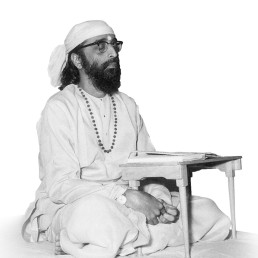
“Think,” Says Pujya Gurudev
For example, desire for wealth is healthy inasmuch as it encourages the mind to act and to accomplish, to acquire and to keep, to earn and to save. But when this desire possesses an individual in such a way that he becomes almost hysterical with his own over-anxiety at his very desire, it makes him incompetent to put forth any substantial creative effort, and thus accomplish glories worthwhile for the dignity of man.
A Desire in itself cannot and does not bring about storms in the mind, as can our longing after those very same desires. The Geeta advises us only to renounce our yearnings for all objects of desires.
Through discrimination and proper intellectual evaluation of the sense-objects, when an individual has withdrawn his mind from its usual sense-gutters, the mind comes to take hold of the subtler and the diviner theme of the Self for its contemplation. The limited and finite sense-objects agitate the mind, while the Unlimited and the Infinite Self brings peace and joy into the within. This condition of sense-withdrawal and the entry into the Self of the mind is called its condition of steadfastness (Yukta).
From Tyagi Magazine
Bhagavad Gita is against this!
Pujya Gurudev Swami Chinmayananda challenges the misconception that spirituality involves escaping from worldly responsibilities, emphasizing instead the importance of fulfilling one’s duties with dedication and surrender to a higher purpose. He advocates that for living vibrantly in society, performing obligations with faith and understanding is essential, rather than renouncing them entirely. Ultimately, He defines true renunciation as redirecting one’s ego towards surrender to a higher power while actively engaging in worldly responsibilities.
